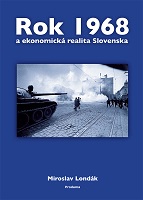Rok 1968 a ekonomická realita Slovenska
The year 1968 and the economic reality of Slovakia
Author(s): Miroslav Londák
Contributor(s): Vlasta Jaksicsová (Editor), Jozef Hupka (Editor)
Subject(s): History, Economic history, Political history, Recent History (1900 till today), Special Historiographies:, Post-War period (1950 - 1989), History of Communism
Published by: SAV - Slovenská akadémia vied - Historický ústav SAV
Keywords: Slovakia; Czechoslovakia; economy; 20th century; communism;
Summary/Abstract: The purpose of this work (book) shall not be an insight into the year 1968 in Slovakia by mapping in detail the development in this period in the economic area, as a certain static picture. The author’s attempt was rather to perceive the events in this year as the outcome of a long-term process, which was actually already determined by the results of WWII. Those results decided that the postwar Czechoslovakia shall belong to the Soviet sphere of influence. The events of February 1948 only confirmed this tendency. A change in the essential social spheres followed and it might be called its systematizm. Not only did the political system change, which was formed into a modern totalitarian form. In the economic area, there were substantial ownership changes and the state became the most significant owner of production means. Gradually, a management system was taken over, which copied the Soviet forms, and the social structure of the society changed almost completely. In Slovakia, the socialist industrialization of the country was happening after February in this connection, supported by the investment from national funds. The importance of industry was increasing; economic activity of the population was growing. The economic growth in the monitored decade in Slovakia was actually in such a state that it provided for advancing towards the level achieved in the Czech countries in relative indicators, but on the other hand, in some of the crucial indicators the absolute differences were growing – e.g. created national income per inhabitant. The problems in the economic development were pointed out by the Slovak economists in the long term and their criticism was also gradually adopted by Alexander Dubček. His critical appearance in September 1967 had actually become a prologue to the events which became known as the Czechoslovak Spring 1968. Naturally, the problems of economic development did not only exist in Slovakia, but on the national level as well, and the economic crisis from the first half of the 1960s began the Šik’s reform. This was gradually implemented but it had some negative effects on the Slovak side. In the course of 1968, all these problems were being solved dynamically, not only in the economic area. From the political point of view, there was an attempt to create „socialism with a human face“, but it was the development in 1968 that proved that the socialist system based on the totalitarian ideology was non-reformable. The following year was only a swan-song of the economic reform which was gradually denounced by the new regime representatives. For the following twenty years, the entire Czechoslovak economy was hereby denounced to stagnation and falling behind the developed western countries.
- Print-ISBN-13: 978-80-969782-1-2
- Page Count: 184
- Publication Year: 2007
- Language: Slovak
- eBook-PDF
- Sample-PDF
- Introduction
- Table of Content

